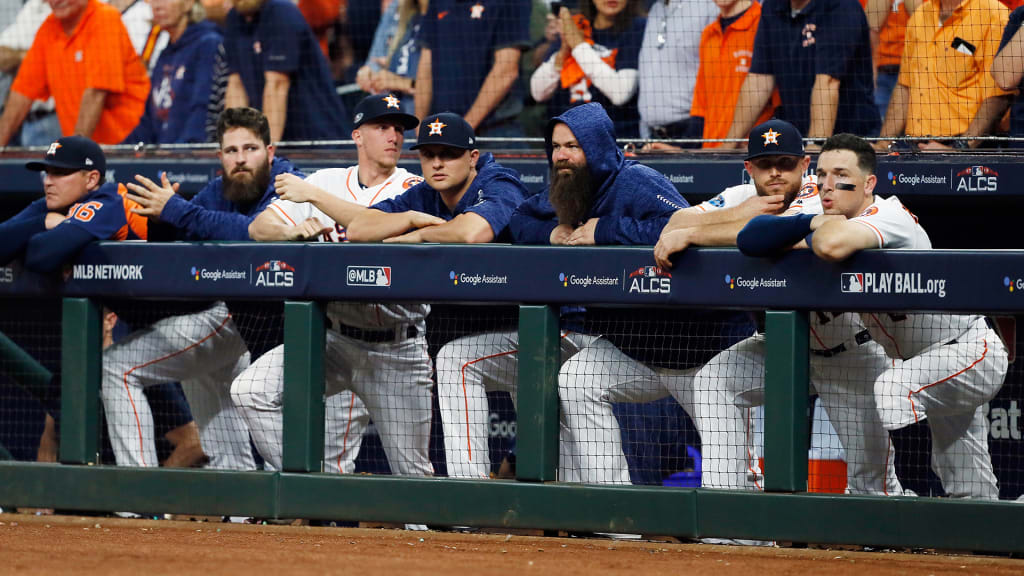
Parity is running paramount in MLB. At least in terms of a different champion hoisting the Commissioner's Trophy after winning the World Series for now 18 consecutive seasons.
With the Astros' elimination after Thursday's 4-1 loss to the Red Sox in Game 5 of the American League Championship Series, MLB will now not have a back-to-back champion since the Yankees won three straight World Series titles from 1998-2000. The longest previous no-repeat record in the Majors had been 14 years in a row from 1979-92, before the Blue Jays repeated as champions in the '93 season.
This stretch now ties the longest in the four American professional sports, according to STATS, evening a streak the NBA had from the 1969-70 season to '86-87.
Houston -- with its loaded lineup, balanced bullpen and starting rotation with four All-Stars -- looked to be as much of a favorite as any over the past 18 years to break the streak -- particularly after sweeping the Indians in dominant fashion in the AL Division Series and continuing with a 7-2 win over Boston in Game 1 of the ALCS. The Red Sox put together four straight wins largely on the shoulders of their offense, which has been their backbone all year and will likely make them the favorite against whoever they meet from the National League. The Dodgers lead the Brewers, 3-2, in the NL Championship Series, which continues Friday on FS1 (8:39 p.m. ET).
While there are a number of factors contributing to a lack of a repeat champion, the game has seen a stronger competitive balance in its current era.
For most of MLB's history, there were two eight-team leagues and the club with the best record in each league went straight to the World Series. The LCS wasn't implemented until 1969, and the LDS wasn't added until '95.
Since the Yanks' dynasty run in the late 1990s, the postseason has expanded to include the AL and NL Wild Card Games, allowing one additional team in from each league into the playoffs, whereas before, a Wild Card winner would automatically be included in the LDS under the same stipulations as a division winner, just as the lowest seed. For example, the 2014 Giants won it all from the second NL Wild Card spot, a seed that wouldn't have existed just three years prior.
The 2017-21 Collective Bargaining Agreement created stiffer financial penalties relating to the luxury tax threshold and stricter outlines on how clubs utilize into their international bonus pool money. And in the previous CBA, MLB implemented competitive balance round Draft picks to create an additional way for small-market and low-revenue clubs to add talent to their organizations, and that process was amended in the current CBA.
In total, MLB has had just 21 repeat World Series champions, with the Yankees accounting for 12 of those (1928, '37, '38, '39, '50, '51, '52, '53, '62, '78, '99, '00). The others are the 1993 Blue Jays; the 1911, '30, '73 and '74 Athletics; the 1976 Reds; the 1922 Giants; the 1916 Red Sox; and the 1908 Cubs. The last defending champions to even play in the World Series the following year were the 2009 Phillies.
In this current stretch, the World Series champions include the 2001 D-backs, '02 Angels, '03 Marlins, '04 Red Sox, '05 White Sox, '06 Cardinals, '07 Red Sox, '08 Phillies, '09 Yankees, '10 Giants, '11 Cardinals, '12 Giants, '13 Red Sox, '14 Giants, '15 Royals, '16 Cubs and '17 Astros.
It's far too early to consider if MLB's no-repeat streak will continue for a 19th year, but it's also hard not to ponder. The Red Sox have a strong offensive nucleus but will assuredly have to put up a fight against the 100-win Yankees again in the AL East next year. The Dodgers have depth, but they will enter the offseason with a throng of free agents, potentially including Clayton Kershaw. And the Brewers have gotten to this point on the back of their bullpen, which may force them to create more pitching versatility.
Each of the clubs remaining has had a different blueprint to get to this point. And there will almost assuredly be other paths teams take to October next season.
